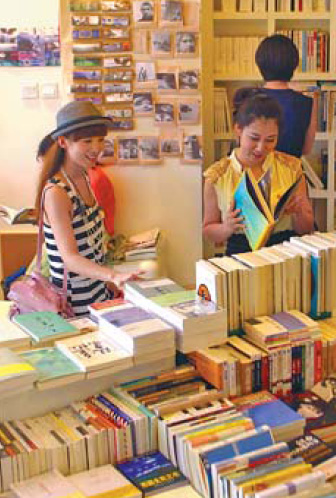Books
Bit by bit, the Web threatens printed word traditions
Updated: 2011-08-16 08:05
By Han Bingbin (China Daily)
|
The One Way Street Library at Solana shopping mall struggles to survive. Zou Hong / China Daily |
The One Way Street Library has long attracted a cross section of Beijing's literary youth.
They discuss authors, intellectuals and art pioneers among shelves filled with literary, art and academic works at their weekly salons in a former gallery in a remote western Beijing suburb.
Readers can pick books from the 30-meter-long shelf to thumb through in the large courtyard.
Founder Xu Zhiyuan says he hopes to provide a "public reading space", where young people "exchange views on books and share opinions on public affairs".
But the library hasn't been able to overcome logistical problems. It is hours from downtown, and most people have to call repeatedly to find it. Because there is no air conditioning, it's chilly in winter and sweltering in the summer. And mosquitoes besiege the space.
Xu spent his life savings trying to keep the doors open as fewer people came.
So when the high-end shopping spot Solana opened downtown in 2009, Xu relocated, although he feels the commercial surroundings betray his original vision.
Manager Wang Yan'an says One Way Street opened a cafe and bought in more casual and lighter books to increase economic viability.
"There has been an increase in sales," she says. "But we are still far from profitable."
The store struggles with limitations of scale and highly focused literary selections. And a new threat is emerging from the Internet.
"Some readers like us because they share our taste and think our store saves them from having to search around huge bookstores," Wang says. "But most people can't find what they like here."
Wang likes the store's offerings but says she understands why some people don't want to shop there. A shopping website recently launched a half-price deal for most of its books. So people have been coming to One Way Street, writing down the titles they want and then buying them online.
"Some readers just think it's abnormal of us not to offer discounts," Wang says. "It's normal for a regular buyer to pay attention to the prices. I would, too, so I totally understand."
Online book retailers have several cost advantages, Wang explains.
They can buy in bulk. They don't need to rent retail outlets and use cheap warehouses far outside the Sixth Ring Road. And they usually work with delivery companies that pay low labor costs.
Wang has concluded there is no way to compete.
"Sometimes, readers who attend the salons buy books to support us," she says. "And some of our previous student customers, who have graduated and started working, remain loyal customers."
One Way Street has been exploring new business fields, such as magazine publishing and hosting literary festivals. But these need large investments.
Money is already short, and such expenses as rent will likely increase.
Outside investors have expressed interest in the bookstore, Wang says, but going this route poses a difficult question.
"If we accept, will we lose our independence?" she says.
China Daily

Specials

Star journalist leaves legacy
Li Xing, China Daily's assistant editor-in-chief and veteran columnist, died of a cerebral hemorrhage on Aug 7 in Washington DC, US.

Robots seen as employer-friendly
Robots are not new to industrial manufacturing. They have been in use since the 1960s.

Smurfs up in China
The movie remake of a classic 1980s cartoon series is expected to have special cross-generation appeal to Chinese filmgoers
